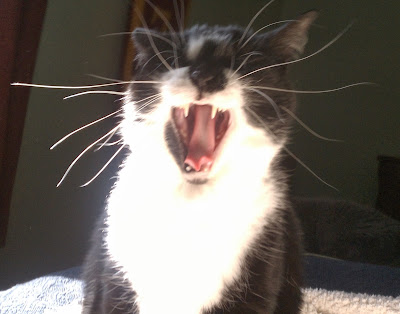Yes, it's true. Today is national cat day. It is the day we worship our overlords, those fuzzy little rumbling creatures that order us about on a daily basis. So much so, they even created their own day. Surprisingly, we don't seem to mind that much.
You may recognize this little ruffian from my profile picture. This is one of most bossy bosses. She rules the house.
In honor of National Cat Day, I'm choosing a glossary entry on a creature of the feline persuasion. Again, this creature is mentioned and has some importance in
Whom the Gods Hate, but there isn't as much described in the book as there is in my glossary. While this cat might not be as likeable as the smaller versions we're used to seeing in a cozier setting, it will have to do.
Protean Lions
Protean lions are twice the size of their nearest relatives, but that is not where the danger lies--protean lions have the ability to change their color. Their coat is composed of clear hairs, each of which picks up its color from the skin beneath, which can change color subtly to match protean's environment. The protean's range of colors isn’t as dramatic as some of the lizards of Tanavia, limited to shifting among blacks, browns, greys, whites, and any of the shades in between. They also have fine tuned enough control of their color-shifting that they can form splotches on their skin making them look like they are covered in dappled shadow. They are excellent predators, often killing prey before they are ever noticed. They hunt from natural ditches, log hallows and trees. They are also known to occasionally hunt in some of the taller grassed plains, but they prefer to stick to forested areas. They will hunt and kill almost anything that is not significantly larger than them. Proteans tend to stick to hunting grazing animals but have been known to take down the unwary human now and again. While they typically avoid humans massed in large numbers, they will attack individuals or small groups without hesitation. Unless fully equipped, a group of five or six humans can be and often is taken down if they encounter a protean. Proteans store what they don’t eat in one sitting in trees or occasionally in small ditches. Even a fully equipped, well seasoned group of a half dozen encountering a protean is likely to lose at least one or two members before the creature falls. This is due to the difficulty in landing a killing blow on the swift creature. Their necks are quite muscular, and few sword blows could penetrate deep enough in one blow to fell the beast. Spears can be used to pierce the heart, but the accuracy required to land such a blow in the face of a charging protean is rare. Other than their ability to change their coats, protean lions have the same general characteristics of other large cats. They are solitary, and do not gather in packs like some great cats. Further, they are highly territorial, with ranges that can extend for several miles. They are not common, live in isolated areas rarely frequented by humans, and only hunt when hungry, so reported attacks on humans are infrequent. Note the term, “reported.” As the beasts are so adept at killing before they are ever seen, many unexplained disappearances in unpopulated areas should rightly be attributed to the protean.

No comments:
Post a Comment